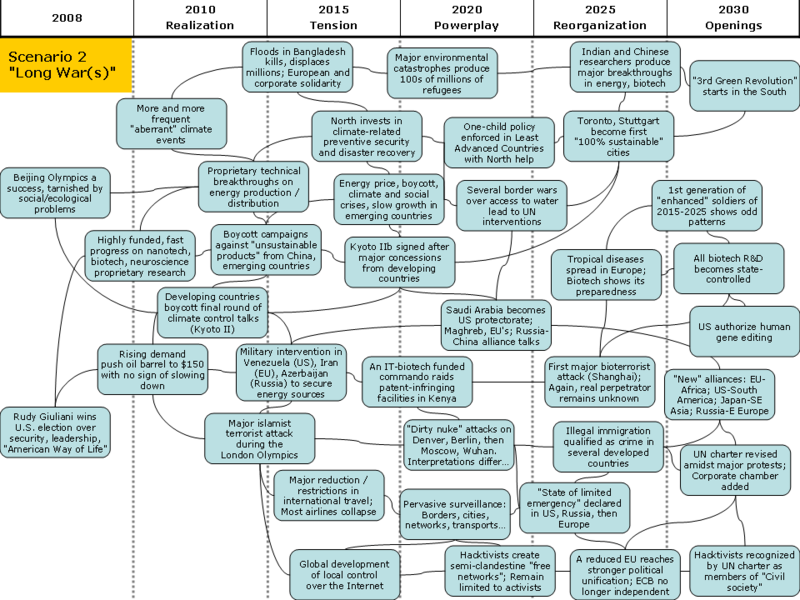Difference between revisions of "Ci'Num scenario 2: Long war(s)"
m |
|||
| Line 26: | Line 26: | ||
The way around global warming and resource shortages is found through the simultaneous modernization of rich countries and slowing down of growth in rising countries, especially in Asia, while the path to industrial growth remains essentially closed to least developed nations. This is achieved by a de facto alliance of governments and large firms in the North, to hoard global natural resources and distribute them in an "ordered" way, giving priority to their home countries and their spheres of influence. This produces a permanent state of low-intensity, mostly economic, sometimes military conflict, mostly involving minor countries, but also using terrorism as a constant threat. Nation-states regain strength as the need for security grows, both internally and externally. International trade is slightly reduced and becomes a political weapon, as does the economy in general, producing erratic movements, inflation and high savings. Technological developments are fast but mostly targeted towards security and sustainability, and unequally shared. Public spirit is incensed, both against exterior enemies, as within countries, with strong opposition movements. Technology also becomes the tool of choice for the emergence of counter-cultures, hoping to bring about major changes in the state of the world and, meanwhile, trying to implement them at local, community- or project-based levels. | The way around global warming and resource shortages is found through the simultaneous modernization of rich countries and slowing down of growth in rising countries, especially in Asia, while the path to industrial growth remains essentially closed to least developed nations. This is achieved by a de facto alliance of governments and large firms in the North, to hoard global natural resources and distribute them in an "ordered" way, giving priority to their home countries and their spheres of influence. This produces a permanent state of low-intensity, mostly economic, sometimes military conflict, mostly involving minor countries, but also using terrorism as a constant threat. Nation-states regain strength as the need for security grows, both internally and externally. International trade is slightly reduced and becomes a political weapon, as does the economy in general, producing erratic movements, inflation and high savings. Technological developments are fast but mostly targeted towards security and sustainability, and unequally shared. Public spirit is incensed, both against exterior enemies, as within countries, with strong opposition movements. Technology also becomes the tool of choice for the emergence of counter-cultures, hoping to bring about major changes in the state of the world and, meanwhile, trying to implement them at local, community- or project-based levels. | ||
<br> | <br> | ||
=Timeline= | |||
<small>''(click image to see it full-size)''</small> | |||
[[Image:CiNum_Scenario2_Timeline.PNG|800px]] | |||
=To be amplified: contribute!= | =To be amplified: contribute!= | ||
Revision as of 14:42, 31 July 2007
Scenariothinking.org > Ci'Num 07 Homepage > The 2030 Scenarios
|
|
Position in the scenario tree
- Will we have the global organizational capacity to address the overshoot? - Yes
- What is the primary constraint of human activities? - Resources
- What are the main mechanisms for organizing large scale systems? [irrelevant]
Initial Description
The way around global warming and resource shortages is found through the simultaneous modernization of rich countries and slowing down of growth in rising countries, especially in Asia, while the path to industrial growth remains essentially closed to least developed nations. This is achieved by a de facto alliance of governments and large firms in the North, to hoard global natural resources and distribute them in an "ordered" way, giving priority to their home countries and their spheres of influence. This produces a permanent state of low-intensity, mostly economic, sometimes military conflict, mostly involving minor countries, but also using terrorism as a constant threat. Nation-states regain strength as the need for security grows, both internally and externally. International trade is slightly reduced and becomes a political weapon, as does the economy in general, producing erratic movements, inflation and high savings. Technological developments are fast but mostly targeted towards security and sustainability, and unequally shared. Public spirit is incensed, both against exterior enemies, as within countries, with strong opposition movements. Technology also becomes the tool of choice for the emergence of counter-cultures, hoping to bring about major changes in the state of the world and, meanwhile, trying to implement them at local, community- or project-based levels.
Timeline
(click image to see it full-size)
